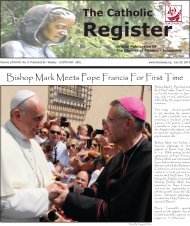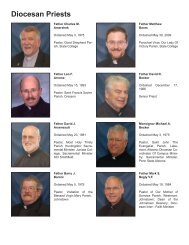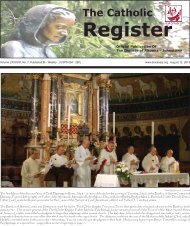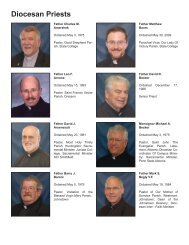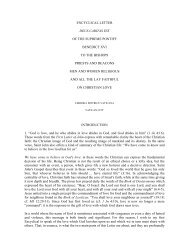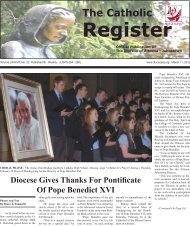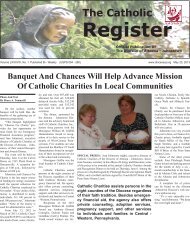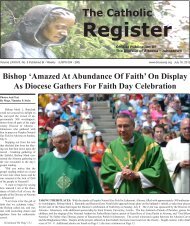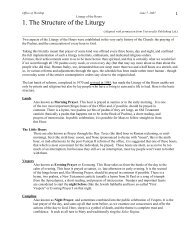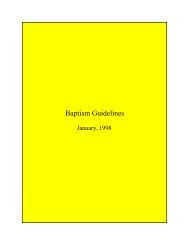May 6, 2013 - Diocese of Altoona-Johnstown
May 6, 2013 - Diocese of Altoona-Johnstown
May 6, 2013 - Diocese of Altoona-Johnstown
Create successful ePaper yourself
Turn your PDF publications into a flip-book with our unique Google optimized e-Paper software.
Page 8 The Catholic Register, <strong>May</strong> 6, <strong>2013</strong><br />
ord <strong>of</strong> Life<br />
The<br />
Pope Teaches<br />
By Pope Francis<br />
One Cannot Follow Jesus,<br />
Or Love Jesus,<br />
Without The Church<br />
VATICAN CITY (CNS) -- Following Jesus means belonging<br />
to the church, the community that gives Christians their<br />
identity, Pope Francis said.<br />
“It is not possible to find Jesus outside the church,” he<br />
said in his Mass homily April 23. “The great Paul VI said it is<br />
‘an absurd dichotomy’ to want to live with Jesus without the<br />
church, to follow Jesus outside the church, to love Jesus without<br />
the church.”<br />
Dozens <strong>of</strong> cardinals living in Rome or visiting the Vatican<br />
joined the pope in the Pauline Chapel <strong>of</strong> the Apostolic Palace<br />
for the Mass on the feast <strong>of</strong> St. George, the martyr. The feast<br />
is the pope’s name day; he was born Jorge Mario Bergoglio.<br />
In his homily, Pope Francis spoke about the persecution<br />
<strong>of</strong> the first Christian communities and how opposition did not<br />
stop them from sharing their faith in Christ, but went hand in<br />
hand with even greater missionary activity.<br />
“Precisely at the moment persecution erupted, the missionary<br />
activity <strong>of</strong> the church erupted as well,” the pope said.<br />
When the first Christians began sharing the Gospel with<br />
“the Greeks,” and not just other Jews, it was something completely<br />
new and made some <strong>of</strong> the Apostles “a bit nervous,”<br />
the pope said. They sent Barnabas to Antioch to check on the<br />
situation, a kind <strong>of</strong> “apostolic visitation,” he said. “With a bit <strong>of</strong><br />
a sense <strong>of</strong> humor, we can say this was the theological beginning<br />
<strong>of</strong> the Congregation for the Doctrine <strong>of</strong> the Faith.”<br />
Barnabas saw that the church was growing, he said. The<br />
church was becoming “the mother <strong>of</strong> more and more children,”<br />
a mother that not only generates sons and daughters,<br />
but gives them faith and an identity.<br />
Christian identity is not a bureaucratic status, it is “belonging<br />
to the church ... the mother church, because it is not possible<br />
to find Jesus outside the church,” Pope Francis said. “It<br />
is the mother church who gives us Jesus, gives us identity.”<br />
Pope Francis said that when Barnabas witnessed the<br />
crowds <strong>of</strong> new believers he rejoiced with “the joy <strong>of</strong> an evangelizer.”<br />
The growth <strong>of</strong> the church, the pope said, “begins with persecution<br />
-- a great sadness -- and ends with joy. This is how<br />
the church moves forward -- as I saint, I don’t recall which<br />
right now, said -- between the persecution <strong>of</strong> the world and<br />
the consolation <strong>of</strong> the Lord. The life <strong>of</strong> the church is this way.”<br />
“If we want to take the path <strong>of</strong> the mundane, negotiating<br />
with the world,” the pope said, “we will never have the<br />
consolation <strong>of</strong> the Lord. If we seek only consolation, it will be<br />
superficial.”<br />
The life <strong>of</strong> the church is a path that always alternates<br />
between “persecution and consolation, between the Cross<br />
and the Resurrection,” he said.<br />
ONE MORE TIME: Bishop Carroll High School, Ebensburg, celebrated graduation on June 3, 1963,<br />
with Mass at Holy Name Church. The new school had been dedicated on June 10, 1962. Bishop J. Carroll<br />
McCormick presented diplomas to the graduates, who were presented to the Bishop by Father Faber<br />
J. Malloy, principal. Monsignor Francis A. McNelis, diocesan superintendent <strong>of</strong> schools, addressed the<br />
graduating class.<br />
What power does a word<br />
have? To a writer, words are<br />
vastly important. This morning,<br />
listening to the radio, I heard the<br />
word “anodyne” and knew that,<br />
first, I didn’t know what it meant<br />
and second, I would find out before<br />
morning’s end.<br />
“Anodyne,” I discovered,<br />
means “serving to alleviate<br />
pain” or “not likely to <strong>of</strong>fend.”<br />
How apt a definition, I<br />
thought, as I mulled over how<br />
words can so easily inspire or<br />
cause <strong>of</strong>fense, and yet, how <strong>of</strong>ten<br />
we fling them about without<br />
appreciating their effect.<br />
The Associated Press announced<br />
that they would no<br />
longer use the term “illegal immigrant.”<br />
Immediately, folks lined<br />
up on either side <strong>of</strong> this word<br />
debate. “Political correctness,”<br />
shouted those who throw that label<br />
at any innovation with which<br />
they disagree. Others, saw wisdom<br />
in the decision. “Illegal immigrant”<br />
so quickly descends to<br />
merely “illegal” as if that singular,<br />
ugly word sums up a fellow<br />
human being whose hopes and<br />
aspirations are akin to our own.<br />
A term that used to be freely<br />
used, is “mental retardation.” It<br />
was not invented or intended to<br />
be pejorative, but to define a certain<br />
level <strong>of</strong> intellectual ability.<br />
But one need only occasionally<br />
visit a school playground to realize<br />
why there’s a movement to<br />
“eliminate the R-word.”<br />
For The Journey<br />
By Effie Caldarola<br />
Words Can Lift Us Up,<br />
Or Weigh Us Down<br />
Words fall from favor, and<br />
rightly so. But one word that<br />
always lifts the heart and never<br />
falls from grace is the word<br />
“hope.”<br />
The season leading up to<br />
and including Lent and the triduum<br />
saw momentous things happen<br />
in our Catholic Church, and<br />
if you weren’t left speechless<br />
-- wordless, as it were -- by the<br />
events <strong>of</strong> this spring, you may<br />
have been like so many with<br />
whom I spoke and consistently<br />
defined this period by one word:<br />
hope.<br />
First, we saw Pope Benedict<br />
XVI make a gracious and spiritfilled<br />
decision to step down from<br />
his weighty burdens. The ordinary<br />
Catholics I meet -- the ones<br />
who reside in pews on Sunday<br />
and not in the sometimes nasty<br />
alternative universe <strong>of</strong> constant<br />
blogging -- thought this move<br />
very practical and timely. Bishops<br />
resign at a certain age, why<br />
can’t a pope pass his duties to<br />
another, younger person? They<br />
saw it as a sign <strong>of</strong>, yep, hope.<br />
Then, everyone used the<br />
word “hope” as the selection<br />
process began, and hope translated,<br />
as it so <strong>of</strong>ten does, into<br />
millions <strong>of</strong> silent prayers. Pope<br />
Francis responded by asking for<br />
our blessing, and then making<br />
the significant gesture <strong>of</strong> visiting<br />
a youth prison and washing<br />
the feet <strong>of</strong> young prisoners --<br />
male, female, Catholic, Muslim.<br />
People I knew were absolutely<br />
thrilled by this.<br />
But sadly, there are some<br />
who are harshly criticizing Pope<br />
Francis already, even his beautiful<br />
trip to the prison. Fortunately,<br />
for my adult life, I’ve remained<br />
with Catholics who, despite difficulty,<br />
live in a sense <strong>of</strong> hope.<br />
Can we criticize a pope?<br />
Of course. We don’t belong to<br />
a cult. We belong to an ancient<br />
community that’s lived through<br />
contentious times but pr<strong>of</strong>esses<br />
a faith in conversation with reason.<br />
We discuss, we debate.<br />
But I want to be like the<br />
American nun interviewed on<br />
television after the pope’s selection.<br />
Why, she was asked, do<br />
you have such hope? She smiled<br />
broadly and said, “I live in<br />
hope.” That’s why I’m a Catholic.<br />
That’s where I want to live,<br />
too.



